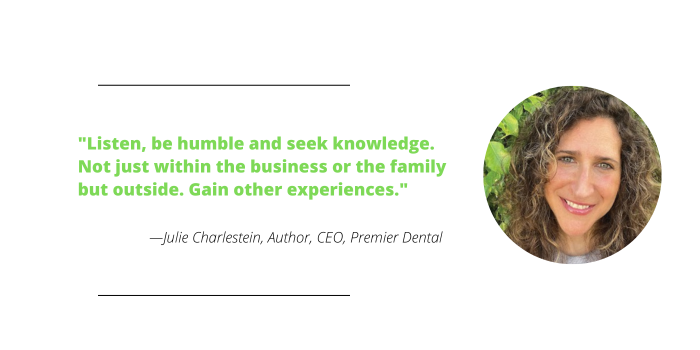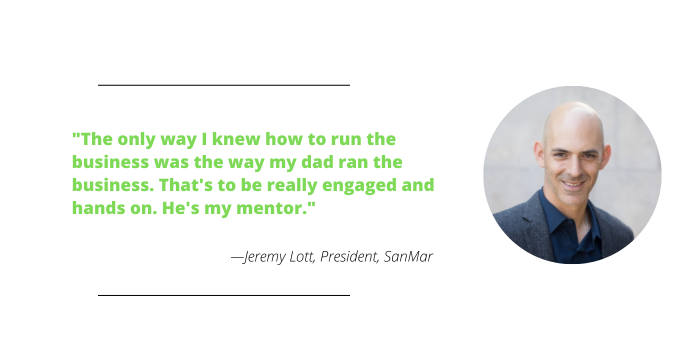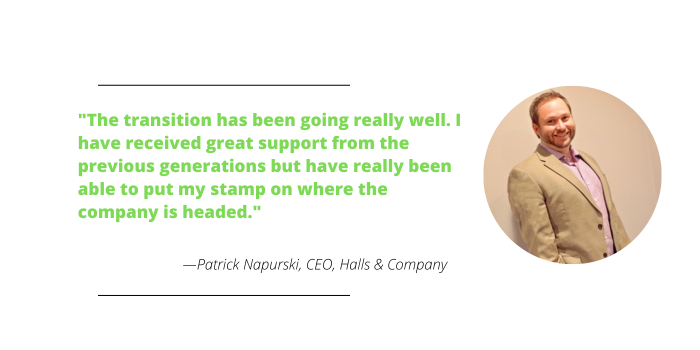Keeping It In The Family: Navigating Succession In Promo

On Sunday, millions of viewers tuned in to see the series finale of Succession (no spoilers here!) to get some sort of conclusion on the state of the Roy family and their media entertainment empire.
The HBO comedy-drama is basically a how-to for toxicity and personality-based dysfunction, but there’s no denying that people are intrigued by the potential drama or storylines that could come out of a family-run business.
The clash of personalities. The circumstances that could lead to jealousy. The transitions of power. It’s like the typical family drama most of us have at some point experienced, only with business decisions and a lot of money at stake.
Of course, Succession is a fictional television show, and it stands to reason that a family business that has lasted several generations likely avoids or minimizes those sorts of dynamics. Otherwise, they wouldn’t have survived and grown over such a sustained period.
You can look no further than the promotional products world – an industry old enough to span many generations – to find plenty of successfully run family businesses. It requires a core foundation laid by the first generation, and new solutions will be needed for the transition of each generation. But the results can be special.
The industry’s biggest supplier, SanMar, is family-run. That supersedes business and becomes a legacy.
“It’s too far out to be thinking about specifics, but I think that we would love to maintain SanMar as a family business [for another generation],” says Jeremy Lott, SanMar’s CEO. “I think that’s important to us.”
PPAI Media talked to Julie Charlestein, author of How To Lead Your Family Business: Excelling Through Unexpected Crises, Choices And Challenges, as well as a few industry veterans who lead family businesses about the process of transition and what to avoid when working so closely with family.

Humility Is Key For Younger Generations
Succession would be a far less entertaining series if all the characters regularly practiced and prioritized humility. Successful businesses require not only knowledge but patience.
- Young professionals are often taught to be assertive, maybe even told to “fake it ‘till you make it.”
- Demonstrating patience and respect is a first step for someone trying to prove they can step into big shoes in a company.
“Listen, be humble and seek knowledge,” says Charlestein, who is a fourth generation CEO of the healthcare company Premier Dental. “Not just within the business or the family but outside. Gain other experiences.”
Patrick Napurski, president and owner of Halls & Company, says that he knew that he was meant to be a part of the family business he grew up around when he was attaining his MBA from Lancaster University in London. An ocean away from the Minnesota-based supplier, he wanted to get back and help the business run, in big and small ways.
As a young man, Napurski started working part-time with Halls & Company back in 1998, coming on as a full-time traveling sales representative in 2005. Since then, he has worked in most divisions of the company and spent seven years on the board of directors.
- In retrospect, working for the company from all angles was essential to his eventual position of leadership, something that his family had stressed.
“I’ve learned that sometimes you need to sit at the end of a conveyer belt and catch product,” Napurski says. “No matter who you are or what you might do, there’s always a chance to help and there’s always something you can add.”
In 2022, five decades after his grandmother, Chris Johnson, founded the company, Napurski took the reins and continued the legacy.
“Keeping the company in the family is a great sense of pride for what has been built and what will continue on,” Johnson said at the time of the transition. “Patrick will continue the tradition of quality and service that has always been the foundation of our company.”
- Over a year later, Napurski feels the company has struck a balance.
“The transition has been going really well,” Napurski says. “I have received great support from the previous generations but have really been able to put my stamp on where the company is headed.”
At SanMar, Lott knows that he wasn’t trusted to take over a successful company so that he could completely reinvent the wheel.
“The only way I knew how to run the business was the way my dad ran the business,” Lott says. “He's my mentor. [The way I know is to be] really engaged and hands-on. I travel almost every week, because for me, being on-site in our warehouses or being with our customers or in our factories, that's how I gain a huge amount of knowledge."

Welcome Fresh Perspectives
A new generation of promo needs to learn from its predecessors before any sort of transition of leadership can be accomplished, but the previous generation needs to welcome the perspectives that their successors bring to the table.
- The next generation will always be more proficient in technology and certain innovations.
- An industry like promo that has been successful for well over 100 years can be tempted to resist innovation, but every thriving company has embraced change at various points.
“Businesses only get to be multi-generational if there is innovation, if there is evolution, if there is change,” Charlestein says. “It may not always be groundbreaking. It can be iterative, but it will be there, and it is necessary.”
Chris Vernon, CEO of The Vernon Company, is a fourth-generation leader of the distributor and already thinking about the point in the future when he someday steps away from his role. Vernon told PPAI Media that he really had to sell his board on the decision to implement solar panels in one of the company’s facilities.
- Implementing solar panels was a way to use recent technologies and trends to prioritize the company’s existing priorities and missions.
“I told my board that maximizing shareholder value is not number one,” Vernon says. “It is important. It is certainly in the top couple. But it’s not the overriding thing in my life. This is my legacy, and my father was the same way. It’s important to make a dollar. But we can make a huge difference for our communities and our families and our associates and all our stakeholders within the company. It’s not just trying to make Chris Vernon rich.”
- Evolution doesn’t come without resistance.
- The one proposing change needs to expect resistance, and the one hearing it out needs to consider open mindedness.
“The generation before you saw the same thing with the generation before them,” Charlestein says. “Will there be resistance to some decisions irrespective as to whether or not they involve change? Yes.”
- Don’t propose innovation and change – even to family members you know well – without research to back it up.
“In making any decisions, I try to have as much data and analysis around the issue as possible,” Charlestein says. “Having objective information often makes decisiveness and buy-in easier.”

It’s The Rest Of The Company That Makes The Difference
Lott and his father developed a goal very early on in the discussions regarding his taking over the company’s leadership. That goal was to have a slow and detailed transition almost to the point where no one would even notice, “whether it was employees or customers or vendors,” Lott says. “It would just feel very natural.”
- But it wasn’t just one man handing power over to his son. That slow transition coincided with other senior leaders of the company retiring.
- It was just as essential that those leaders could help prepare their successors and the changing positions could all share a similar vision.
“We have a new, next generation of leadership at SanMar, and we’ve been able to transition really successfully, so I’m super proud of that part of the business and the team that we have today,” Lott says.
“I feel honored to get to work with the folks that I work with today.”
Taking over a family-run business is difficult, but Napurski says, when in doubt, create a good culture for your employees so that you can lean on them.
“One key piece [to the transition] has been the employees,” Napurski says. “This year we were awarded ‘PPAI Greatest Companies To Work For,’ for which I am incredibly proud as change can be hard. Our employees have really embraced looking at our capabilities with fresh eyes and exploring the possibilities of our manufacturing. It's resulted in some great new ideas and opportunities.”
Promotional Products Are Not Always Hereditary
Perhaps most importantly, Charlestein warns against pressuring the next generation into an industry they might not be as passionate about.
“In my experience, not having pressure or a mandate to join the business was a big driver,” Charlestein says. “There was always a tremendous sense of pride around the business and the family, but no ultimatums in terms of roles. Should the next generations decide to join, exposure to the totality of the business is essential, while working through various levels of the organization.”
We all tend to project expectations onto our families. Fathers or mothers or siblings or children can say things that wouldn’t bother us if said by a friend or stranger but trigger emotions coming from family. If transparency is already a crucial part of a successful company culture, it’s even more important when avoiding the potential pitfalls of working with family. Watch just about any scene of Succession to see the opposite dynamic at work.
“Making assumptions and harboring resentment [is a common mistake],” Charlestein says. “Communication and expectations need to be very clear. You may not always get everything that you want. The sooner that you can revert your energy to what you do have the more successful you can be.”
Families can bicker and they can disagree. But they can accomplish a great deal through shared vision and evolving viewpoints.
“Family business is amazing,” Charlestein says. “Family business is frustrating. Family business is a blessing. So is life. Learning to navigate all of it is the privilege.”

